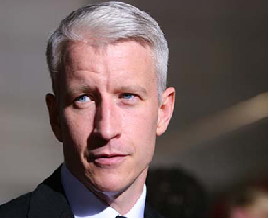 |
| Anderson Cooper (theuniblog.evilspacerobot.com) |
Never allowed to be set free, a young man imagines himself standing shackled at his wrists and ankles. You would never guess this man is the renowned reporter, Anderson Cooper, who was forced to adapt a life of extreme trauma after a series of horrific events hit him in the ripe stages of his life. Cooper was born on June 3, 1967 to Gloria Vanderbilt and the writer Wyatt Emory Cooper. Cooper grew up in Manhattan; independent and confident that he could build himself a bright future, even though he was guaranteed a fruitful life ahead because of his already-successful parents. Achievement was something Cooper was encouraged to strive for after his father's sudden death in 1978, rather than having his mother, hand it to him. Many people still hotly debate whether Cooper deserves his spot on television, or if his rich parents had already set the stage for him. Nevertheless, Cooper has essential traits everyone should admire and recognize as qualities that got him this high up in the news business: courage, determination, and sincerity. These characteristics are what got Anderson Cooper to the position he is in now, not his parents' wealth. Superheroes may have supernatural powers, but Anderson Cooper's strong character is just as mighty as the ability to fly or read minds. Anderson Cooper has proven to the world how courageous, determined, and sincere he is by reporting his influential and hard-hitting news. In the process, Cooper is himself and presents himself in front of the camera with confidence and a smile.
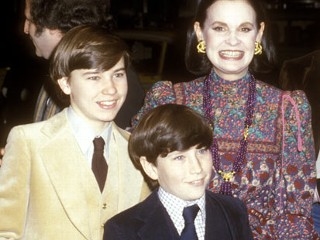 |
| Cooper with brother & mother on April 18, 1979. (http://abcnews.go.com/ ) |
Misfortunes pummeled Anderson Cooper, rapidly tightening the shackles wrapped around him, but what stands out is his courageousness to, slowly but surely, rip off the chains that contained his abilities he would daringly use to explore the catastrophes of his life, He did this because he wanted to know why life seems so unkind at times and he did not understand the realness, and the surrealness of death. Cooper and his family had the "glitz and glamour" life before his father passed away when Cooper was at the tender age of eleven. Enduring the pain as best he could, Cooper continued his job, only to have another tragedy lasso him into its seemingly unbreakable grip: "... his brother, Carter, who had been under treatment for depression, jumped out of the 14th-floor window of their mother's New York City apartment in front of her, and fell to his death. When Cooper finished his degree, he considered taking the U.S. Foreign Service examination, a common career choice given his Ivy League education, but opted instead to become a news correspondent. He was especially eager to get into the war zone, which he admitted was indirectly linked to the family tragedy" ("Anderson Cooper"). Amazingly, even after having to struggle with his family members' deaths, war zones were places Cooper was "eager" to visit. Exposing the viewers to the same things he was learning and experiencing, Cooper helped not only himself, but also the public. He helped get others past similar emotions he tried to comprehend for himself. Cooper constituted enough courage to put himself directly ahead of his pain, and understood that visiting war zones made him as vulnerable as ever. Anderson Cooper pushed all this aside and took on this challenge anyway. The battlefield is not the only place Cooper shows his courage, but he manages to show his viewers, some who are able to relate better to Cooper's life than others, that when he faces his problems, it encourages him to tolerate his losses: "'After that,' Cooper says,'I wanted to be in places where survival was an issue and people talked about real things. Places where life and death were real. People are often very uncomfortable talking about death, grieving and loss. I wanted to go somewhere where the language of loss is spoken'" (Albiniak). To be able to connect to his audience, Cooper set out to face his struggles by deciding he was going to set out and visit places where death was prevalent and surround himself among things surely capable of bringing back horrible memories. He gave this much thought, summoned all his bravery, and displayed it clearly while he was abroad in Africa, Vietnam, and other foreign countries, surrendering himself to accepting his family mishaps and emotional hardships. Cooper has used his courage as a tool throughout his career, to explore and make new discoveries regarding why tragedies happen. Anderson Cooper knew he was susceptible to blundering, because he is human; but knowing the lengths of his courage, he felt confident he was capable of facing his life's harshest events.
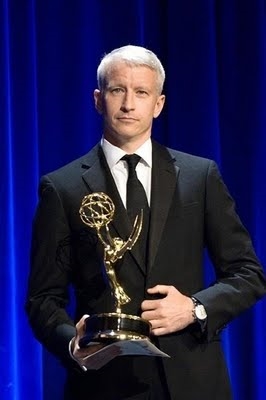 |
| Anderson Cooper winning an Emmy in 2006 (http://thoroughlyandersoncooper.blogspot.com/2009/09/2009-emmys.html) |
It is evident that Anderson Cooper's determination not to let his past hold him back let him find a gateway to express his depression and acquire happiness. Under Cooper's circumstances, many people would let their sadness get the better of them; but Anderson Cooper ultimately chose carpe diem: "Cooper left Yale early to travel around sub-Saharan Africa, where he became sick with malaria. But that did not lessen his drive to travel and cover the events he encountered" (Albiniak). The word determined comes to mind when considering Cooper's longing to keep working his job, even though he became ill. Cooper's will to keep pushing even after boulders rolled over him allowed Cooper to keep going in his job as a reporter and win four Emmy Awards, two in 2006, two in 2011. If he hadn't been as determined as he was, Cooper would have never made it so high up in the industry and would have ended up living off his parents' fortune. By rejecting an already-set, secure life, Cooper was sure he could make his life his own: "Despite the family fortune, Cooper was determined to earn his own money. He began modeling at the age of eleven, and in his teens worked as a waiter at Mortimer's, a famed Manhattan eatery frequented by Park Avenue Society types" (Brennan). Although some people would disagree, it was not his mother's wealth, and it was not his father's television experience which allowed Cooper to get ahead of other anchors. Cooper and his determination to work vigorously towards his goals allowed him to become one of the best in the news business. Everything Cooper accomplished was his own work. His dedication not only to his job, but being the leader of his own life, is truly admirable. Starting out well did not satisfy Cooper's wishes to lead a life controlled by himself, so he simply earned his life, instead of having the world handed to him on a silver platter. Slowly removing himself from the sadness of his early life also started to remove and unlock the chains that had hampered Cooper, allowing him to reach his full potential. When Anderson Cooper realized this as a problem, he found the key to the locks and slowly unbound himself from imprisonment.
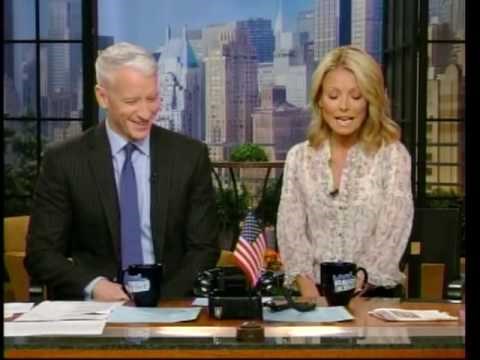 |
| Anderson Cooper and Kelly Ripa (blogspot.com/2011/07/anderson-cooper.html) |
Anderson Cooper possesses the ability to be sincere whenever he is translating the information he has observed to his audience because he makes the news he tells relatable and understandable. Cooper does not have the stereotypical "anchor tone", reporting news just to relay information to others. He is sympathetic and understanding of the situations happening worldwide: "'So many people know him as this champion of people who have no voice,' says Kelly Ripa. 'When he started hosting with me, we brought out the irreverent side of him'" (Hiltbrand). Kelly Ripa says people know Cooper for being a "champion of people who have no voice" because of his sincerity and his aptitude for connecting with the people listening to what he has to say. Cooper doesn't have the fake side many well-known celebrities have to maintain their reputations. Anderson Cooper doesn't have a problem defying what others have to say if he feels it is the right thing to say. In 2005 while interviewing Mary Landrieu about the aftermath of Hurricane Katrina, a disagreement came up. Cooper dauntlessly stared straight into the camera and said: "'Excuse me, Senator, I'm sorry for interrupting. I haven't heard that, because, for the last four days, I've been seeing dead bodies in the streets here in Mississippi. And to listen to politicians thanking each other and complimenting each other, you know, I got to tell you, there are a lot of people here who are very upset, and very angry, and very frustrated... And when they hear politicians slap -- you know, thanking one another, it just, you know, it kind of cuts them the wrong way right now, because literally there was a body on the streets of this town yesterday being eaten by rats because this woman had been laying in the street for 48 hours. And there's not enough facilities to take her up. Do you get the anger that is out here?'" (CNN Transcripts). Cooper unleashed his anger, but was very respectful while getting his point across. Anderson Cooper's ability to feel what the Hurricane Katrina victims felt connects to why he wanted to report these kind of stories in the first place. Knocking down one boulder at a time, Cooper unlocked yet another chain that had enveloped him in its grasp. The chain that had tormented him after his father's death, his brother's suicide. Being sympathetic to others and feeling emotions was something Cooper admitted he could not do under regular circumstances, going as far as calling himself a "wasp" on the Ellen show. Yet, while comprehending peoples' emotions similar to his, Cooper suddenly breaks free. Cooper also mentioned at Columbia University, when Channel 1 first hired him, he thought the news was very "artificial". Because of this, he filmed his own news and carried a home camera to videotape his experiences purely and organically. Cooper doesn't mask his emotions when telling the news, and is not afraid to show anger, remorse, or genuine happiness while reporting: "Cooper sees a direct link between the two shows. 'What I feel most fulfilled doing are the very human stories,' says the well-travelled Cooper, 44. 'In news, you can only do that when there's a big event like Hurricane Katrina or the 2004 tsunami. In daytime, you can do human stories about real people in a variety of situations that you can't on an evening newscast'" (Albiniak). Anderson Cooper has a strong interest in stories affecting and impacting ordinary peoples' lives. He enjoys discussing the personal side of his job, where it requires more emotion and empathy for the interviewer to know what the situation is. Cooper's passion to continually feel fulfillment while presenting human stories justifies the emotion he must endure along with the people and events he reports. The emotion is never made-up or forced, and viewers of his shows; Anderson Cooper 360°, 60 Minutes, and CNN, have said Cooper is: "one of the most sincere people to report on the air". Anderson Cooper is absolutely touching and this can be seen in his interactions with people and interpretations of the news. Cooper delves deeply, not only in his reports, but into the spirit of his audience.
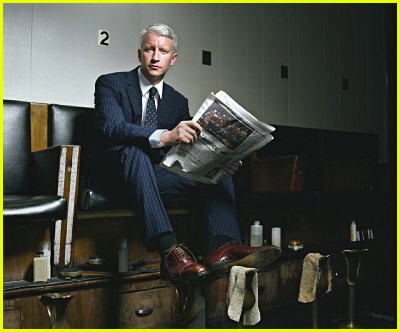 |
| Anderson Cooper (http://collegecandy.com/tag/cnn/ ) |
Opening up on television as a reporter gives Cooper an outlet to finally rid himself of the shackles on his body and simply let go. Cooper's audience realizes his sincerity while he tries to understand the emotional aspect of news, bravely revisits events that had previously wounded him, and acts with the same determination present in his eyes when starting a task. Reporting in war zones, growing up in New York with wealthy and well-known parents, losing family members, and continuing to study, subsequently being sick, sets Cooper apart as an authentic hero. His pure and transparent personality can be an inspiration to anyone and everyone. Anderson Cooper realizes "people change, things go wrong, but [he] just remember[s] life goes on." Not being afraid to expose his real self to the public reminds viewers they do not need to worry about their reputation. He has taught millions, including a shy person like me, to speak out if they feel like something should be said. While growing up, I had a hard time speaking my mind, and I had a hard time communicating with other kids. Watching Cooper report as a young girl cracked my shell and allowed me to develop from a timid child into the bold young woman I am today. Without Cooper, I would have no voice, I would have no opinions, and I would have no ideas to offer the world. Although his striking looks may catch your eyes while watching the news, Anderson Cooper's unbridled persona, words, and actions will surely find a way to your heart.
Works Cited
Albiniak, Paige. "Finding meaning in the journeys: Cooper built career as face of CNN reporting
'very human stories'." Broadcasting & Cable 1 Aug. 2011: 30. Gale Biography In Context.
Web. 28 Mar. 2012
"Anderson Cooper." Contemporary Authors Online. Detroit: Gale, 2007. Gale Biography In
Context. Web. 28 Mar. 2012.
"Anderson Cooper." Newsmakers. Detroit: Gale, 2006. Gale Biography In Context. Web. 21 Mar.
2012
Brennan, Carol. "World Biography." Anderson Cooper Biography. Advameg, 2006. Web. 28 Mar.
2012
Hiltbrand, David. "New Talk Show Brings out Anderson Cooper's Soft-news
Side."EBSCO:host. EBSCO, 09 Oct. 2011. Web. 27 Mar. 2012.
CNN. "CNN.com - Transcripts." 302 Found. CNN, 1 Sept. 2005. Web. 11 Apr. 2012.
<http://transcripts.cnn.com/TRANSCRIPTS/0509/01/acd.01.html>.
"CNN S Anderson Cooper Addresses the Students of Columbia University School of Journalism."
Sciencestage.com. 22 Jan. 2009. Web. 12 Apr. 2012.
a-university's-school-of-journalism.html>.
Page created on 4/22/2012 12:00:00 AM
Last edited 5/6/2019 6:09:59 PM
